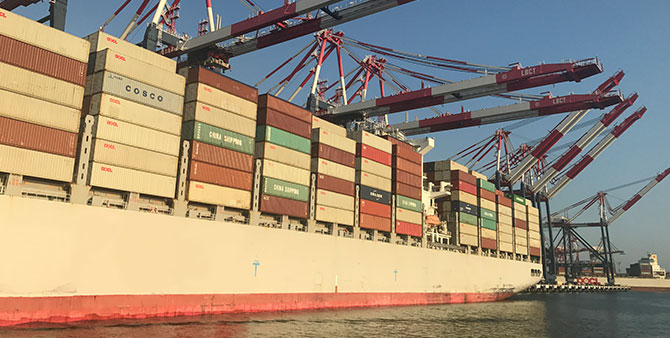What is IMO 2020?
IMO 2020 is an environmental regulation targeting the amount of sulfur in marine fuel oil that went into effect on January 1, 2020. The International Maritime Organization (IMO) is a specialized agency of the United Nations responsible for regulating
shipping. Prior to 2020, the content of sulfur in fuel could be at 3.5%, but with IMO 2020 that sulfur content was reduced to 0.5%. This regulation applies to ocean going vessels, such as container ships, vehicle carriers, and roll-on/roll-off vessels.
IMO 2020’s goal is to reduce sulfur emissions and is a step towards creating a greener maritime industry.
What Industries are Impacted by IMO 2020?
The two main industries affected by IMO 2020 are the global shipping and trucking industries. The shipping industry will be impacted the most since it has relied heavily on high-sulfur fuel oil. In order to meet the new regulations, shippers are switching
over to low-sulfur fuel, which is already a more expensive option and has risen since IMO 2020 went into effect.
Despite having already adopted certain restrictions on high-sulfur fuel, the U.S. marine shipping industry will need to make changes to meet IMO 2020 requirements. The U.S. is one of four regions that have been classified by IMO as an Emission Control
Area (ECA), which includes the Caribbean Sea, North Sea, Baltic Sea, and U.S. and Canadian coasts. ECAs have more stringent emissions laws than the rest of the globe and have had a sulfur cap of 0.1%since 2015. While ECA regulations are more restrictive,
they only apply to operations within roughly 200 miles of North American shores. Once a vessel exits an ECA, they can comply with IMO regulations, meaning they can switch over to 0.5%sulfur fuel from 0.1%. The challenge for U.S. ports is to increase
the volume and availability of low-sulfur fuel that complies with both the new IMO 2020 and the earlier-adopted ECA regulations.
The trucking industry may also be indirectly affected by the new regulations, specifically in relation to diesel fuel pricing and availability. While IMO 2020 does not regulate diesel fuels used in trucks, it may have a ripple effect on pricing and availability.
The low sulfur content in some diesel fuels has made them one of the leading candidates for use in the marine shipping industry. There is growing popularity amongst the shipping industry for the use of diesel distillate fuels to power their ships,
mainly marine gasoil and marine diesel oil. With more carriers shifting towards using diesel fuels to power their ships, it is quite possible that less diesel fuel will be available for trucks, which may result in an overall increase in cost.

Looking to the Future
One short-term solution by shippers to meet the regulations is to retrofit their vessels with scrubbers, which allow the vessels to continue burning the high-sulfur fuel. The scrubber cleans out most of the sulfur content in the fuel and meets the regulations.
Looking to long-term solutions, the industry is trying to be more innovative and move away from sulfur oil altogether and into more environmentally friendly fuels such as liquified natural gas (LNG). These carriers and shippers are performing tests and
experimentation with big oil companies to figure out ways to lower and completely phase out these types of emissions. This research is very important, since the IMO has a proposed regulation of reducing greenhouse gases by 50%of the levels from 2008.
Even though that is 30 years away, it’s coming, and we still don’t have the technology available to meet these proposed regulations.
IMO 2020 is a step in the right direction towards lowering emissions, but there still needs to be more accomplished in terms of completely phasing out sulfur, nitrogen emissions, and reducing greenhouse gases. Hopefully as more testing is conducted, we
will have the technology necessary to meet upcoming IMO regulations.